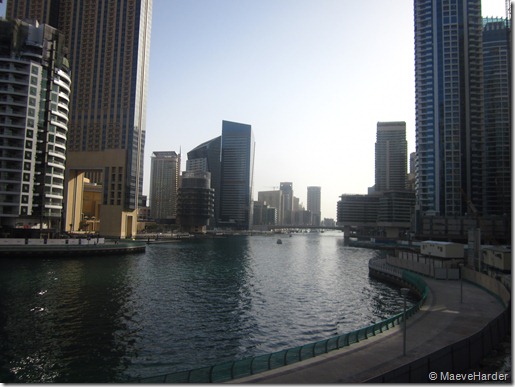Where in the world are the Emiratis?
Dubai’s population is more than 80% expatriates. The most visible are the British bank executives, looking uncomfortable and self-aware in second-hand Porsches, adjusting their Montblanc’s in shirtpockets while waiting impatiently for elevators. Or the Eastern-European models, clicking through swanky bars in white high-heels no matter what the season. Usually they appear to be wearing the best clothes they own- often a jumble of expensive items that don’t quite match. Hiding behind these women and at the bottle-service tables of the bankers are escorts and prostitutes of all nationalities. They’re smiling coyly and walking in the wake of Arabian businessmen who are visiting from other GCC countries, dressed in traditional thawb and adjusting their reverent head-coverings as they sip fruit-juice and admire their fair-skinned companions.
Step out of the tallest buildings, the world’s biggest mall, and the expats are less obvious. Indian housewives sport salwar khameez and redrape their dupatta as they inspect imported vegetables at the corner grocer. The new arrivals seem to be biting their tongues, reminding themselves that here the prices are set. More established ladies come in and have their regular order passed over the counter, the price agreed upon in a one-time-negotiation in which God, Shiva, and Allah were all invoked to save one side from being cheated by the other. They return to their apartments on the Indian side of town, living their same lives as Mumbai but with better roads and schools.
But the expats most intriguing are in the service positions, living below the radar and in Dubai purely for the opportunities to earn. Afghanis dream of government jobs in Kabul, but are continuously blocked because of their family ties just across the Pakistan border: they become cab drivers, marketable because of their English skills picked up from soldiers at home. Barefoot Bangladeshi’s, fled to India and picked up by construction gangs, exported to Dubai to work 18 hours a day on Jumeirah’s latest “tallest” or “largest” or “greatest.” Filipino nurses, with advanced degrees and babies at home in Manila, are hired by wealthy Arab families as nannies. They wear hospital scrubs while following Burka-clad ladies through the mall carrying their babies. Many of these less glamorous live in dormitories and cash-only apartments, almost all of them are sending their paycheck to wherever they call home.
Everybody seems to come to Dubai with a dream of glamour and wealth: but that seems to mean something fiercely different depending on where your passport was issued.

” ‘tallest’ or ‘largest’ or ‘greatest.”
Loved this piece, and loved the photo!
very insightful Maeve. love it
Despite the cons of being in Dubai, the pros certainly weight heavier. Sure your salary is determined at work depending on the passport you own, but at the same time there are thousands of people who in their home country couldn’t make as much as they make here, yes it is the generous exchange rate but it also means that their countries currently are not economically strong enough to provide them what they need. My 2 cents
I partially agree Ashley. There are definitely some pros, and there are loads of people who I have met who say that their life is a million times better in Dubai. Some Muslims say they have far more freedom in Dubai than in their home country, some from struggling nations tout the economic opportunities and the political stability. For a Westerner, however, some of the disparities in such a “modern” place are shocking. And what makes me nuts are the false promises made to so many in the worker class.